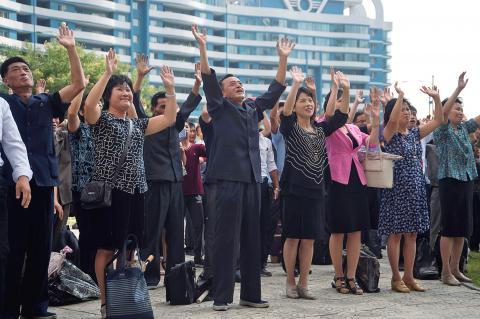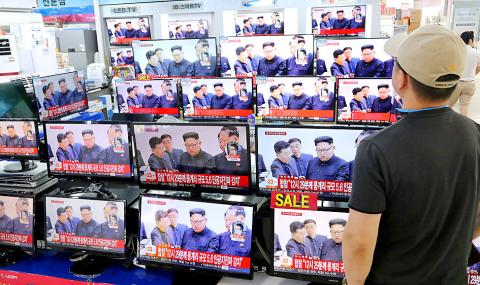North Korea’s biggest nuclear test to date was condemned around the world yesterday, with US President Donald Trump saying “appeasement” would not work as the authorities in Pyongyang “only understand one thing.”
The test was carried out at 12:29pm at the Punggye-ri site where North Korea has also conducted past nuclear tests.
The explosion of what the North said was an advanced hydrogen bomb was a “perfect success,” Pyongyang said.

Photo: AFP
Though the precise strength of the blast has yet to be determined, South Korea’s weather agency said the artificial earthquake it caused was five to six times stronger than tremors generated by Pyongyang’s previous tests.
It reportedly shook buildings in China and in Russia.
Officials in Seoul put the magnitude at 5.7, while the US Geological Survey said it was a magnitude 6.3.

Photo: Reuters
The strongest artificial quake from previous tests was a magnitude 5.3.
The explosion came just days after the North fired a missile over Japan and a few hours after Trump spoke with Japanese Prime Minister Shinzo Abe by telephone about the “escalating” nuclear crisis.
Trump, who said after last week’s missile launch that talking to Pyongyang “is not the answer,” tweeted that yesterday’s test showed North Korea’s “words and actions continue to be very hostile and dangerous to the United States.”
China had tried but failed to solve the problem, he said, while what he called South Korea’s “talk of appeasement” would not work as “they [the North Koreans] only understand one thing!”
Russia struck a more cautious tone.
“In the emerging conditions it is absolutely essential to keep cool, refrain from any actions that could lead to a further escalation of tensions,” the Russian Ministry of Foreign Affairs said, adding that North Korea risked “serious consequences.”
Moscow said talks were the only way to resolve the crisis. Russian President Vladimir Putin was due to meet later yesterday with Chinese President Xi Jinping (習近平) in China.
China urged North Korea to stop “wrong” actions and said it would fully enforce UN resolutions on the country.
South Korean President Moon Jae-in Korea chaired a National Security Council meeting and National Security Director Chung Eui-yong said Moon would seek every available measure, including new UN sanctions or the deployment of more US military assets, to further isolate Pyongyang.
Officials in Seoul also said Trump’s national security adviser, Lieutenant General H.R. McMaster, spoke with Chung for 20 minutes in an emergency phone call about an hour after the detonation.
British Secretary of State for Foreign and Commonwealth Affairs Boris Johnson called the nuclear test “reckless” and a “provocation.”
“They seem to be moving closer towards a hydrogen bomb which, if fitted to a successful missile, would unquestionably present a new order of threat,” he told Sky news, adding that there were no palatable military solutions.
French President Emmanuel Macron urged the UN Security Council to act.
“The international community must treat this new provocation with the utmost firmness, in order to bring North Korea to come back unconditionally to the path of dialogue and to proceed to the complete, verifiable and irreversible dismantling of its nuclear and ballistic program,” he said in a statement.
The International Atomic Energy Agency, which has no access to North Korea, called the nuclear test, Pyongyang’s sixth since 2006, “an extremely regrettable act” that was “in complete disregard of the repeated demands of the international community.”
North Korea’s state-run television broadcast a special bulletin yesterday afternoon to announce the test. It said leader Kim Jong-un attended a meeting of the ruling party’s presidium and signed the go-ahead order.
Earlier in the day, the party’s newspaper ran a front-page story showing photographs of Kim examining what it said was a nuclear warhead being fitted onto the nose of an intercontinental ballistic missile.
The photos showed Kim talking with his lieutenants as he observed a silver, peanut-shaped device that the state-run media said was a thermonuclear weapon designed to be mounted on the North’s “Hwasong-14” intercontinental ballistic missile.
The North claims the device was made domestically and has explosive power that can range from tens to hundreds of kilotons. Outside experts suggested the yield of the device tested yesterday might be in that ballpark, though closer to the lower range.

The CIA has a message for Chinese government officials worried about their place in Chinese President Xi Jinping’s (習近平) government: Come work with us. The agency released two Mandarin-language videos on social media on Thursday inviting disgruntled officials to contact the CIA. The recruitment videos posted on YouTube and X racked up more than 5 million views combined in their first day. The outreach comes as CIA Director John Ratcliffe has vowed to boost the agency’s use of intelligence from human sources and its focus on China, which has recently targeted US officials with its own espionage operations. The videos are “aimed at

STEADFAST FRIEND: The bills encourage increased Taiwan-US engagement and address China’s distortion of UN Resolution 2758 to isolate Taiwan internationally The Presidential Office yesterday thanked the US House of Representatives for unanimously passing two Taiwan-related bills highlighting its solid support for Taiwan’s democracy and global participation, and for deepening bilateral relations. One of the bills, the Taiwan Assurance Implementation Act, requires the US Department of State to periodically review its guidelines for engagement with Taiwan, and report to the US Congress on the guidelines and plans to lift self-imposed limitations on US-Taiwan engagement. The other bill is the Taiwan International Solidarity Act, which clarifies that UN Resolution 2758 does not address the issue of the representation of Taiwan or its people in

US Indo-Pacific Commander Admiral Samuel Paparo on Friday expressed concern over the rate at which China is diversifying its military exercises, the Financial Times (FT) reported on Saturday. “The rates of change on the depth and breadth of their exercises is the one non-linear effect that I’ve seen in the last year that wakes me up at night or keeps me up at night,” Paparo was quoted by FT as saying while attending the annual Sedona Forum at the McCain Institute in Arizona. Paparo also expressed concern over the speed with which China was expanding its military. While the US

SHIFT: Taiwan’s better-than-expected first-quarter GDP and signs of weakness in the US have driven global capital back to emerging markets, the central bank head said The central bank yesterday blamed market speculation for the steep rise in the local currency, and urged exporters and financial institutions to stay calm and stop panic sell-offs to avoid hurting their own profitability. The nation’s top monetary policymaker said that it would step in, if necessary, to maintain order and stability in the foreign exchange market. The remarks came as the NT dollar yesterday closed up NT$0.919 to NT$30.145 against the US dollar in Taipei trading, after rising as high as NT$29.59 in intraday trading. The local currency has surged 5.85 percent against the greenback over the past two sessions, central